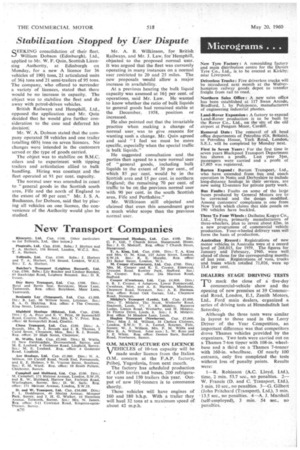Stabilization Stopped by User Dispute
Page 54

If you've noticed an error in this article please click here to report it so we can fix it.
SEEKING consolidation of their fleet, William Dobson (Edinburgh), Ltd., applied to Mr. W. F. Quin, Scottish Licensing Authority, at Edinburgh on Monday, for a new A licence for 36 vehicles of 190+ tons, 21 articulated units of 361 tons and 21 semi-trailers of 95 tons. The company, who offered to surrender a variety of licences, stated that there would be no increase in capacity. The object was to stabilize the fleet and do away with petrol-driven vehicles.
British Railways and Hemphill, Ltd., opposed the application and Mr. Quin decided that he would give further consideration to the case and deferred his decision:
Mr. W. A. Dobson stated that the company operated 58 vehicles and one trailer totalling 603+ ions on seven licences. No changes were intended in the customers served or the type of goods carried.
The object was to stabilize on R.M.C. oilers and to experiment with tipping trailers and articulation allied to bulk handling. Hiring was constant and the fleet operated at 91 per cent. capacity.
The normal user was amended in court to " general goods in the Scottish south area, Fife and the north of England to the extent of 90 per cent." Mr. I. S. A. Buchanan, for Dobson, said that by placing all vehicles on one licence, the convenience of the Authority would also be studied. Mr. A. B. Wilkinson, for British Railways, and Mr. J. Law, foillemphill, objected to the proposed normal user. It was argued that the fleet was currently operating in many instances on a normal user restricted to 20 and 25 miles. The new proposals would allow a major increase in availability.
At a previous hearing the bulk liquid capacity was assessed at 16+ per cent. of operations, said Mr. Law. He wanted to know whether the ratio of bulk liquids to general goods had remained stable at the December, 1958, position or increased.
He also pointed out that the invariable practice when .making a change of normal user was to give reasons for wanting such a change. Mr. Quin agreed and said "I feel we must be more specific, especially when the special traffic is bulk liquids."
He suggested constiltation and the parties then agreed to a new normal user of " general goods, including bulk liquids to the extent of 30 per cent., of which 85 per cent. would be in the Scottish area and 15 per cent, in northern England; the remaining 70 per cent. of traffic to be on the previous normal user with 90 per cent. in the south Scottish area, Fife and Perthshire."
Mr. Wilkinson still objected and claimed that even this amendment gave a much wider scope than the previous normal user.




















































































































